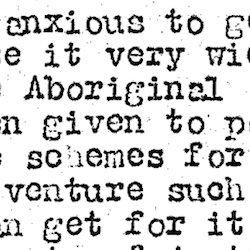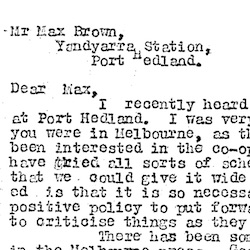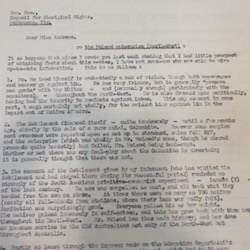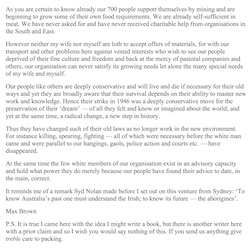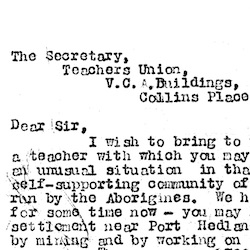The Council’s bulletin was a means of disseminating information about the strike and the cooperative.
Council for Aboriginal Rights Spreads Information
Council for Aboriginal Rights, Bulletin, no. 6, 26 August 1955
Visit of Mr Don McLeod
We are pleased to report that Mr McLeod’s lecture tour of the eastern states was most successful. As well as 3 weeks in Melbourne, he had a very busy 10 days in Sydney and 5 days in Adelaide. In Victoria, he spoke to some 2,700 people who made up a most varied audience from all sections of the community. Included in this audience were groups of university students, technical-school students, factory workers, mass meetings of trade unionists, the Melbourne Trades Hall Council, many organisations, including the Australasian Book Society, Jewish organisations, youth and church groups, etc.
The Lower Melbourne Town Hall had been booked for June 7th for a public meeting. There were about 100 people present from organisations and Mr McLeod was very enthusiastically received. Mr Bill Onus appealed for a collection to cover Mr McLeod’s expenses, and ₤50 was donated by the audience.
We were fortunate in having the co-operation of the Australasian Book Society in arranging a number of joint meetings. The book society had just published a fine novel, “The Mirage”, by F.B. Vickers, giving a realistic picture of the way Aborigines are treated in W.A. Much of the story is set in the Marble Bar district with which Mr McLeod is familiar, and about which he could speak with complete authority. This novel is a worthwhile attempt to deal with social problem in a truthful and thoughtful manner, and cannot fail to impress everyone who reads it. We were most grateful to the Australasian Book Society for their co-operation and their assistance with the day-to-day organisation of Mr McLeod’s tour.
As well as addressing a number of evening meetings, Mr McLeod also spoke at a number of lunch-time meetings of workers, students, etc. He also had a considerable number of discussions with organisations and individuals interested in the Aboriginal question, including Dr H.V. Evatt, Leader of the Opposition, and Mr A.A. Caldwell, Deputy Leader of the Opposition, as well as a number of leading trade union officials. Pastor Doug Nicholls arranged for a visit to some of the country centres with large Aboriginal populations, including Echuca and Mooroopna so that Mr McLeod was able to meet some of the Aborigines to whom he related the story of the successes achieved by the Aborigines in W.A. Mr McLeod spoke for 1/2 hour at one of the regular weekly Trades Hall Council meetings, and 1 /2 was allowed for questions. This is an unusually long time for a guest speaker as the Council always has a considerable amount of business on its agenda. He was very well received, and had many pledges of support. Mr McLeod gave a press conference and a number of individual press and radio interviews, including with 3AW and one with the ABC for Frank Legge’s weekly magazine.
While Mr McLeod was in Melbourne, two tape recordings were made of Mr McLeod’s account of his experience since he started working with the Aboriginal people of the North-West. These will be very valuable for using at future meetings. He also supplied material to the Women’s International League of Peace and Freedom for submission to the United Nations. We would like to thank this League, and especially Mrs Anna Vroland, for their valuable assistance and cooperation on this matter.
Collections were taken up at some of Mr McLeod’s meetings, and a number of people were so impressed by his story that they voluntarily made a donation, so that we received a total of about ₤80 in Melbourne, and ₤31 in Sydney. The Sydney meetings followed a similar pattern to those in Melbourne. Mr McLeod was able to make contact with the federal headquarters of a number of the larger trade unions while he was in Sydney, and discuss the situation of the Aboriginal workers with them. He spoke at the Sydney Trades Hall Council, and at a number of lunch-hour meetings. A very successful meeting was held at the University, which was sponsored by the Aboriginal Scholarship Committee and the Anthropology students, and was very well attended.
Mr McLeod managed to pack a lot of activity into his few days in Adelaide. He spoke at 4 Australasian Book Society meetings, 2 lunch-hour meetings at factories, and one at the University. The Aboriginal Advancement League organised a most successful meeting for him, at which he was able to meet some of the League’s enthusiastic members who work so hard for justice for the Aborigines. Mr McLeod was also able to contact the Adelaide Trades Hall Council and the Australian Labor Party, as well as local newspapers and radio personnel.
We have heard from Mr McLeod since he returned to Perth that he has addressed similar meetings there, so that in one trip he has managed to reach a very large audience with his very inspiring account of the fine efforts being made by the Pilbara group to attain economic independence and a free and dignified way of life.
The Pilbara Group
The first time Don McLeod came into the public eye as a leader of the Aborigines was during a strike waged in 1946 of a number of Aboriginal workers in the Port Hedland district of the North-West. These workers had gone on strike for a minimum wage of 30/- per week, and Don McLeod by reason of his experiences as an active trade unionist was able to advise them on how to act together for a common aim. Feeling ran very high in the district, particularly among the station-owners, and every effort was made to break this strike, using all the restrictive clauses in the old Act.
On one occasion, Pastor P. Hodge, secretary of a church group in Perth working on behalf of the Aborigines, was sent up by his organisation to get the facts behind this strike. He had been off the ’plane at Port Hedland only half an hour when he was arrested for being at a place where natives were congregated (without the written permission of a protector. Section 40 of the old Act). Both Pastor Hodge and Don McLeod ended up in the Port Hedland gaol on this occasion. Don McLeod admits to some 9 trips into this and similar edifices charged with similar offences under this Act. The Act was so framed that no matter what contact any white man had with Aborigines with intent to assist them, he would be sure to contravene some sections of the Act. It is obvious that considerable courage and self-sacrifice was needed from anyone who tried to help the Aborigines in W.A.
The strike was not directly successful, but many of the Aborigines refused to return to their jobs under the old conditions, and began to work together in a co-operative group hunting kangaroos for skin, collecting pearl shell etc. Don McLeod joined this group, took out a number of mining leases, and they started a cooperative mining group. State laws relating to the registration of cooperatives require that members must sign a paper stating that they have read the articles and are in agreement with them. This was not possible as most of the Aborigines concerned are illiterate. It was also found that there were considerable legal advantages in being registered as a company because Aborigines gain certain rights as share-holders of such a company which they are denied as individuals. The Northern Development and Mining Company Pty Ltd was accordingly registered in 1951.
Don McLeod acted as the group’s business manager, but all matters were thoroughly discussed by meetings of the Aboriginal membership. The Aborigines, many of them still with strong links with the old tribal organisation, accepted modern democratic forms of organisation with enthusiasm, and the affairs of the Group have always been conducted by elected committees at all levels. The members of the Group are experts at mining with simple equipment, and were able to make mining the economic basis of the life of the Group. Instead of receiving regular wages, food, clothing and other necessities were purchased in bulk, and the rest of the money earned was mining was used to buy four pastoral properties, Yandyarra, Glen Ern, Riverdale and Meetheena. This was party of a long-range plan to give stability to the Group’s activities and to make them more independent for food supplies. The enormous distances in the North-West make stores such as tinned and processed foods extremely expensive. Don McLeod had great plans for the development of these stations on modern agricultural lines. He was confident that his Aboriginal colleagues would be just as efficient in developing the stations along new lines as they have been in mining under difficult and primitive conditions that would defeat most white men.
The mining leases operated by the Group are scattered over an area roughly 150 square miles, and the four pastoral properties over an area of about 1,000,000 acres. The Group has been mining tanto-columbite recently. This provides rare metals used in jet-engine construction. Its price rose sharply for a period owing to the fact that large quantities were being stock-piled by America. Don McLeod has very high praise for the skill of his Aboriginal colleagues in all branches of the work they have been doing, and considers that “they are the best prospectors in the world”. Some idea of the scope of their mining activities can be realised from the fact that they built ₤13,000 worth of roads into one mining area. A half-caste, Ernie Mitchell, acts as field superintendent of the work.
The Group operates in small working parties scattered over the large area, and each party has its own working organisation with one of its members elected as “boss” of that party. The living conditions vary according to where they are operating. Some of the permanent camps have buildings of various types, while the outer vamps are usually just tents and similar temporary structures. Don McLeod was assisted greatly by Mrs Des Stuart, a triple-certificated nurse who was also a trained teacher and had many abilities that were most valuable in their life in an isolated group. Mts Stuart is part-Aboriginal, and was able to help the Aboriginal women to adopt all sorts of new ways including encouraging them to take an active part in the control and organisation of the Group. Unfortunately Mrs Stuart is seriously ill at present, and has had to leave the Pilbara for the time being. We hope that she will soon will be well enough to return, as she is sorely missed by the people there.
There were differences of opinion in the beginning as to whether the members should follow the old laws or abandon them altogether. It was finally agreed that the main structure of the old laws relating to social customs should be kept, and this has been followed. There have been some gradual modifications, and certain old customs have been dropped, in particular the habit of settling differences by fighting. It is now completely accepted that any differences will be settled by discussion. The old marriage laws are followed, as well as other moral standards traditional to the old ways.
The financial side of the Group’s activities in Perth were looked after by the Directors of the Company which included Don McLeod and a Mr O’Shannasy, an accountant who was employed as secretary for the Company. In 1952, the number of Aborigines in the Group had risen to 600, and the income that year was ₤70,000. Activity on this scale requires considerable capital outlay and planning, and there were great problems to be overcome continually. At one stage the Government was approached for financial assistance, and two Government nominees were accepted onto the Board of Directors. However, the financial assistance promised did not materialise except for some hire-purchase machinery.
A number of financial problems arose in 1953-54. During this period, at a time when Don McLeod was away in Perth trying to arrange for Government assistance, Ernie Mitchell, the field superintendent, went down with pneumonia. While he was ill, a quantity of very low-grade mineral was mined, sharply reducing the income, so that the financial problems became really acute. Instead of the Government giving the very moderate amount of assistance that would have been required to tide the Group over these difficulties, the Government nominees, in conjunction with the secretary, put the Company into liquidation in August 1954.
In reviewing this period, Don McLeod recounted a number of financial transactions that he considered were mishandled by the secretary at the time. Port Hedland is some 1000 miles away from Perth, and the difficulties of keeping a proper liaison between the business and the practical working affairs of the Group were considerable. Don McLeod and Ernie Mitchell have issued a writ in the Supreme Court against this Mr O’Shannasy, making numerous claims based on his handling of their affairs prior to putting the Company into liquidation. One of the most important of these claims is one for unpaid wages. As the money which would have been paid to the Aborigines in wages had been used to acquire the station properties, they are claiming that these properties should not be sold to pay creditors of the Company.
Don McLeod and his legal advisers are making very effort to save as much as possible of the assets for the Aborigines who have worked so hard for them. The main problem facing them now is the lack of money to support the Group’s daily life. Some of the time, the Group has had to live on a diet of kangaroo meat and water, as they had no ready money to buy stores despite the fact that they were still continuing with the mining.
The attitude of the Native Affairs Department does not reflect much credit on that Department. Right from the time of the appointment of Mr S. Middleton as Commissioner, Don McLeod had been in touch with him, and kept him fully informed of the activities of the Group. Shortly before he came to Melbourne, Mr McLeod reluctantly came to the conclusion that Mr Middleton had been working against the Group for some time. The attitude of the Department seems to indicate that the Department is not keen to see Aborigines becoming independent and capable of managing their own affairs, but prefer the old, degrading “hand-out” system. This impression has since been strengthened by the sale of the Moola Bulla cattle station, and their treatment of the Aborigines living there.
The Native Affairs Department took over as selling agent for the Pilbara Group in December 1954, and handled the minerals they had mined. Despite the fact that they sold minerals worth ₤4000, up to June the Group had received only ₤900 worth of stores, and a truck worth ₤500. While the Group was reduced to a diet of kangaroo meat and water, the Native Affairs Department held over ₤1000 of the Group’s money. Don McLeod was present at an interview between Mr Middleton and the leading members of the Group last May. Mr Middleton told the Group that he was not prepared to help them unless they disassociated themselves from Don McLeod. The members of the Group indicated that they were prepared to give Mr Middleton a trial as manager of their affairs but would not cut themselves off from Don McLeod. When Mr Middleton was adamant that this condition must be observed before any assistance was forthcoming, their spokesmen replied as follows: “They had been battling for 9 years, and during that time only one honest man of all the people in Australia had appeared to help them, and that was McLeod. He had lived with them, battled with them, starved with them, and been in and out of trouble with them, and was their mate. If they could have only one out of McLeod and Middleton, they would choose McLeod”.
In the discussions that followed as to what was to happen to the rest of the money due to them from the ₤4000, Middleton indicated that he intended to divide the money among them individually, including the truck that would have to be sold. This would mean that their few assets that enabled them to make some sort of living would be entirely dissipated. The truck, which is essential for their mining work, has since been forcibly repossessed by one of the patrol officers. Such actions by the Department’s officers lead one to the conclusion that their solution to the Group’s problems is to reduce the members of the Group to a state of destitution so that they will then be eligible for the Department’s degrading “hand-out”.
Ernie Mitchell, the field superintendent, is a most able person with plenty of initiative and he has arranged to have another truck. Under conditions of considerable hardship, with insufficient stores and with their future clouded in uncertainty, the Group members are battling on. Their main aim is to retain their independence, and to be able to earn their own living in the manner they choose. Their difficulties are magnified by the fact that there is no literate Aborigine among the Group’s members at the moment. Letters that were being sent to Ernie Mitchell c/o the patrol officer have not reached him. The Group was therefore cut off from reliable communication with its legal representatives, and this nearly caused Mr McLeod’s visit to the eastern states to be cut short. He had been in Melbourne only a few days when it appeared that he would have to return some 3000 miles to the Pilbara to cope with several urgent problems. Fortunately he was able to arrange for someone, who has worked for the Group before, to go up to act as a contact with Perth.
The whole situation, including the negotiations with the Department, is obscured by the mass of legal technicalities that appear in any dealings with Aboriginal Affairs. Every move made by any person, whether white or coloured, has to be judged according to the numerous sections of the Native Administration Act. The position is further complicated by the fact that the Act has recently been amended. Some of the worst clauses have been removed but there are still many objectionable features. It can still be used to obstruct anyone trying to help Aborigines to get some independence for themselves.
Mr Middleton is using Section 35 of the Act to retain the money and the assets of the Pilbara Group. This section authorises the Commissioner to take over the property of any native without the permission of that native if it is “necessary to provide for the due preservation of that property”. As it is possible to use the provisions of the Act against the Aborigines, it is necessary to counter this wherever possible by using any legal mechanism that may be operated to their advantage. Don McLeod has, therefore, taken the wise step of registering another company for his Group. Except for Don McLeod and another person, whose signatures were needed for the setting up of the Company, no one but Aborigines will be able to be shareholders. Every type of business activity has been allowed for in the Company’s articles so that they could branch out into any kind of undertaking in the future.
Don McLeod puts up a very good case for the restoring of the 1% of the gross revenue of the State of W.A. to the Aboriginal people. This was granted to them in 1890 at the time the state was given its sovereignty by Queen Victoria. In fact, it was made a condition of the granting of the sovereign rights. After agreeing to it in order to get their rights, one of the first things done by the new parliament was to pass a bill cancelling this. This was the first of many unjust laws by the W.A. parliament against the Aboriginal people. There is considerable doubt as to whether the parliament had the constitutional power to alter what in fact was a royal edict, and Don McLeod is convinced that the old law providing for the 1% could be revived by due legal process. He also considers that this money should not be wasted on the salaries of Government servants but should go straight into the hands of the Aborigines. It could well be handled by companies such as the Pilbara Group has set up, in which their money can be managed in the same business-like manner as are the investments of white people in Australia.
We are hoping that some organisation, such as one of the larger trade unions, will be able to advance the urgently needed finance to keep the Group going through this difficult period. Every obstacle has been placed in their path by the very people who should be helping them. It is certain that if this financial aid is provided, the Pilbara Group will be established on a permanent basis and will continue to grow and to develop further its inspiring experiment in cooperative living.
…
Shirley Andrew
Hon. Secretary
Citation
Council for Aboriginal Rights Bulletin no. 6, August 1955.


